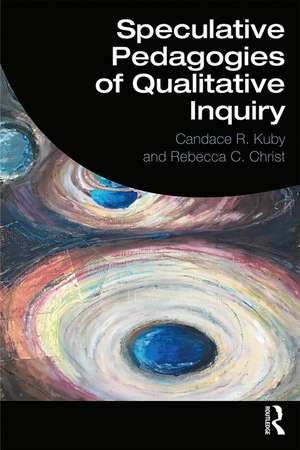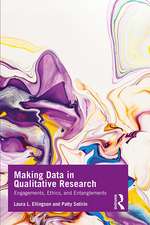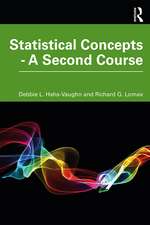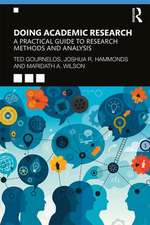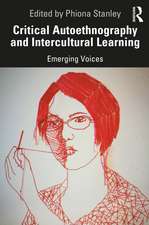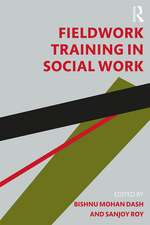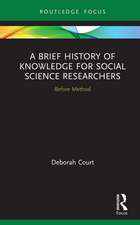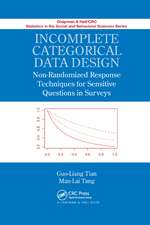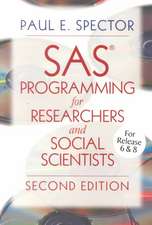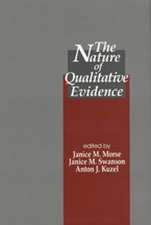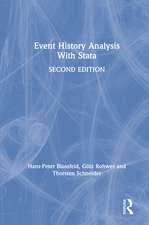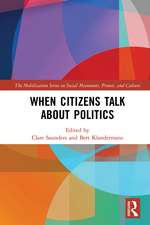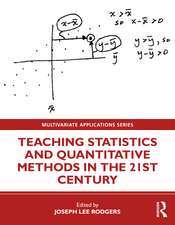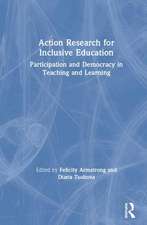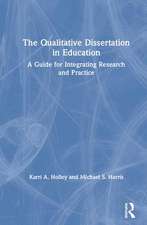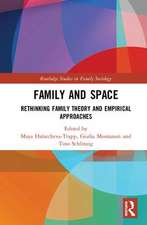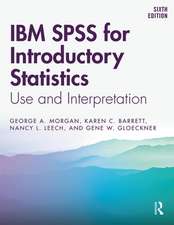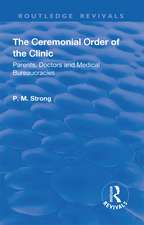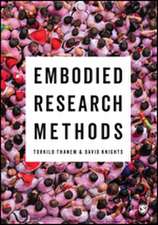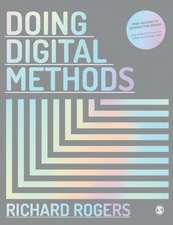Speculative Pedagogies of Qualitative Inquiry
Autor Candace R. Kuby, Rebecca C. Christen Limba Engleză Paperback – 26 noi 2019
This book seeks to teach students to become qualitative inquirers, not with a formulaic recipe but rather by showing them how to think from a place of uncertain, (w)rest(full), relational liveliness. The authors seek to create qualitative inquiry courses that create spaces that consider our abilities to respond to, come to know (epistemology), be (ontology), and do (axiology) qualitative inquiry. Thus, a main thread of this book is (re)thinking and (re)imagining inquiry that they come to conceptualize as (in)query. The authors use both data from graduate level research courses and theoretical concepts from poststructuralism, posthumanism, and feminist "new" materialism.
This book is timely in the face of a growing neoliberal academy that values prescription and repetition over innovation, thinking differently, and engaging with research. It will be an invaluable resource for graduate students looking to use qualitative inquiry in their research.
| Toate formatele și edițiile | Preț | Express |
|---|---|---|
| Paperback (1) | 380.60 lei 6-8 săpt. | |
| Taylor & Francis – 26 noi 2019 | 380.60 lei 6-8 săpt. | |
| Hardback (1) | 992.59 lei 6-8 săpt. | |
| Taylor & Francis – 26 noi 2019 | 992.59 lei 6-8 săpt. |
Preț: 380.60 lei
Nou
Puncte Express: 571
Preț estimativ în valută:
72.89€ • 75.10$ • 61.06£
72.89€ • 75.10$ • 61.06£
Carte tipărită la comandă
Livrare economică 24 februarie-10 martie
Preluare comenzi: 021 569.72.76
Specificații
ISBN-13: 9780367250461
ISBN-10: 0367250462
Pagini: 194
Ilustrații: 56
Dimensiuni: 156 x 234 x 11 mm
Greutate: 0.31 kg
Ediția:1
Editura: Taylor & Francis
Colecția Routledge
Locul publicării:Oxford, United Kingdom
ISBN-10: 0367250462
Pagini: 194
Ilustrații: 56
Dimensiuni: 156 x 234 x 11 mm
Greutate: 0.31 kg
Ediția:1
Editura: Taylor & Francis
Colecția Routledge
Locul publicării:Oxford, United Kingdom
Public țintă
Postgraduate and ProfessionalCuprins
List of Figures
Acknowledgements
Preface
Introduction: A Backstory to Our CurriculumPedagogy
Chapter 1: (Re)Etymologizing: Our Thinking/Writing/Theorizing Together
Chapter 2: The Be(com)ing of (In)query as Uncertain (W)rest(full) Relational Liveliness
Rabbit Hole: Rabbit Holing
Chapter 3: Trust(ing): Strings Strongly Stringed Together in Mundane Everydayness
Rabbit Hole: Succulent Muse
Chapter 4: Navigating and Negotiating: Becoming Qualitative (In)querers
Rabbit Hole: Fullness
Chapter 5: E/Intervening: An Ethics of Always, Already Being In-Between
Rabbit Hole: TheoryPractice
Chapter 6: Speculative Pedagogies of Qualitative Inquiry
References
Acknowledgements
Preface
Introduction: A Backstory to Our CurriculumPedagogy
Chapter 1: (Re)Etymologizing: Our Thinking/Writing/Theorizing Together
Chapter 2: The Be(com)ing of (In)query as Uncertain (W)rest(full) Relational Liveliness
Rabbit Hole: Rabbit Holing
Chapter 3: Trust(ing): Strings Strongly Stringed Together in Mundane Everydayness
Rabbit Hole: Succulent Muse
Chapter 4: Navigating and Negotiating: Becoming Qualitative (In)querers
Rabbit Hole: Fullness
Chapter 5: E/Intervening: An Ethics of Always, Already Being In-Between
Rabbit Hole: TheoryPractice
Chapter 6: Speculative Pedagogies of Qualitative Inquiry
References
Notă biografică
Candace R. Kuby is Associate Professor of Learning, Teaching, and Curriculum at the University of Missouri serving as Department Chair and Director of Qualitative Inquiry. Her research interests include the coming-to-be of literacies when children work with artistic and digital tools, and approaches to and pedagogies of qualitative inquiry.
Rebecca C. Christ is Assistant Professor of Social Studies Education in the Department of Teaching and Learning at Florida International University. Her research interests include social studies education, specifically focusing on the area of genocide education, and pedagogies of qualitative inquiry, drawing on poststructural and posthuman theoretical concepts.
Rebecca C. Christ is Assistant Professor of Social Studies Education in the Department of Teaching and Learning at Florida International University. Her research interests include social studies education, specifically focusing on the area of genocide education, and pedagogies of qualitative inquiry, drawing on poststructural and posthuman theoretical concepts.
Recenzii
What happens when we thinkteach qualitative (in)query with uncertain, (w)rest(full), relational liveliness? In Speculative Pedagogies of Qualitative Inquiry, Kuby and Christ slow down to engage in and with moments sparked by their own pedagogies and muse on the nuances of (in)query practices. A lovely text to think-with and teach-with.
Kelly W. Guyotte, Assistant Professor of Qualitative Research, University of Alabama
Kelly W. Guyotte, Assistant Professor of Qualitative Research, University of Alabama
Descriere
This book looks at how theories of postqualitative research and onto-epistemological thought might benefit the teaching of qualitative inquiry. It examines the concept of ‘inquiry’ as a way of relational thinking in research subjects and research practices.
